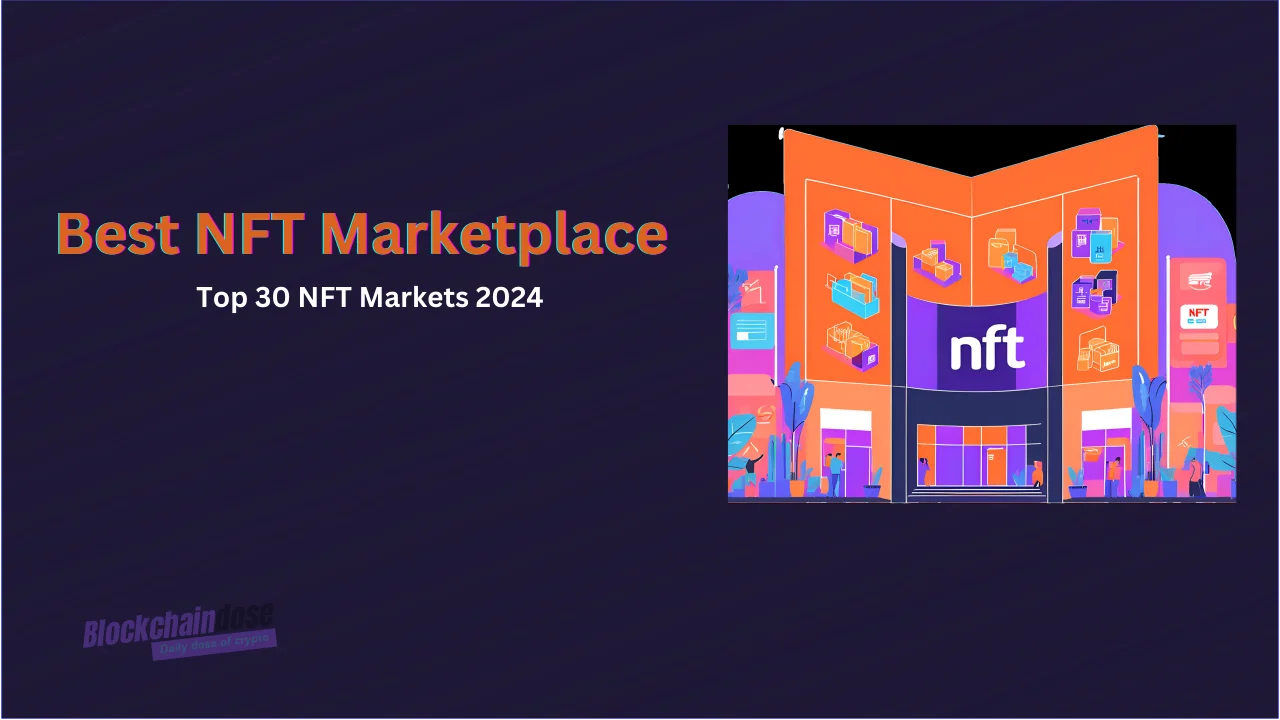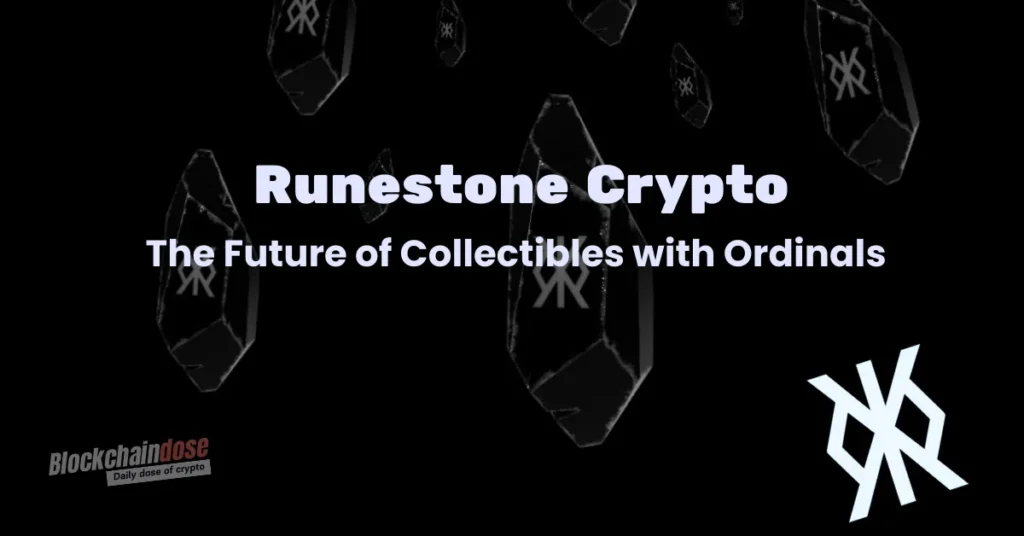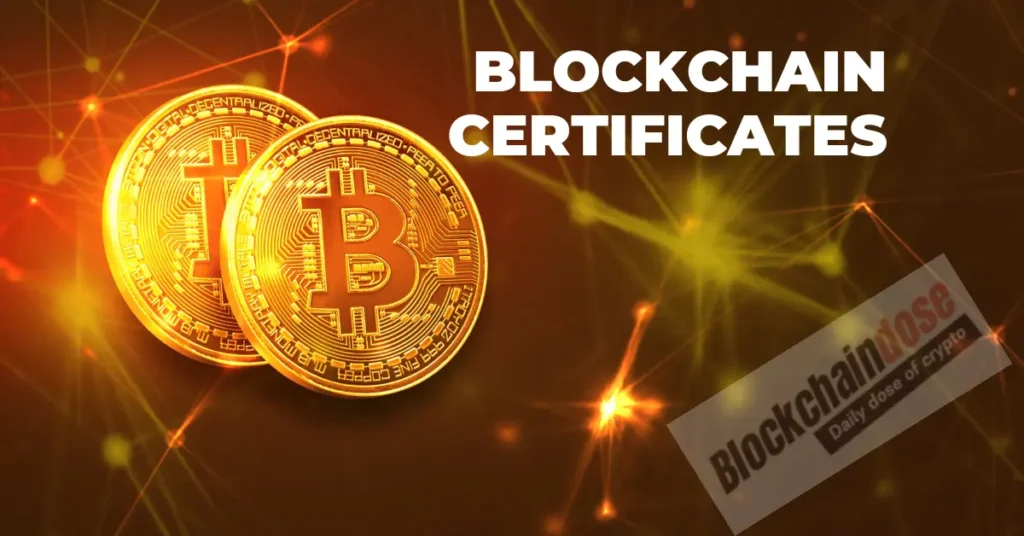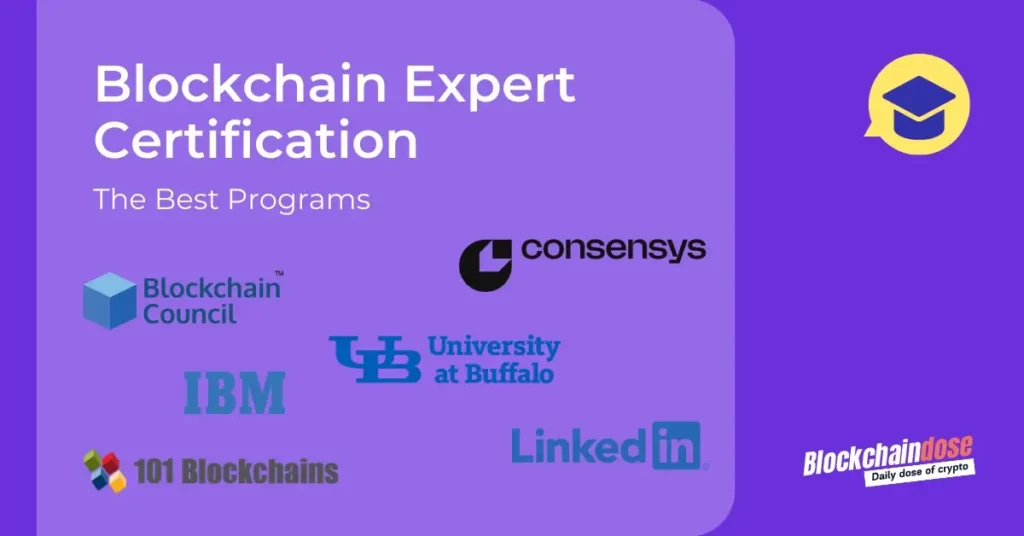Are you an NFT enthusiast still looking for the best marketplaces to buy and sell NFTs? According to DappRadar, over 896 marketplaces claim to offer NFT trading, buying, and selling services. Choosing one of the many is already a tough task for rookies.
On top of that, the NFT space is ripe prey, especially for scammers looking to steal hard-earned money from investors. Hence, the complexity of choosing the best NFT marketplaces for buying and selling increases.
However, you need not worry! Our guide lists 30 of the best NFT marketplaces, leaving you with a smaller list to choose from.
What is an NFT Marketplace?
By now, you have likely dipped your toes in the world of non-fungible tokens, noticing the endless benefits offered to investors. But where do you buy these digital assets? Enter the NFT marketplaces!
An NFT marketplace is a digital hub where buyers, sellers, and creators meet to mint, trade, and exchange NFTs. Think of NFT marketplaces as the Amazon or Alibaba of the blockchain world—only they bring their twist, decentralization. Every trade, purchase, or sale in the NFT marketplace economy is recorded on the blockchain, bringing transparency.
NFT marketplaces typically offer three primary key services:
- Buying and selling: Users can purchase or auction NFTs.
- Minting: Creators can turn digital files, including music, videos, PDFs, and images, into new NFTs.
- Trading: Some platforms allow holders to swap NFTs with other assets.
How to Choose the Best NFT Marketplace for Your Needs
To win big in the NFT world, you must pick the best NFT marketplace for your goals. While the list of NFT marketplaces keeps growing, only a few can guarantee to fulfill your needs.
Not all investors are cut from the same cloth — everyone’s choices hinge on their preferences and objectives. As an investor, you must keep in mind the following key factors:
Pinpoint Your Goals
What’s your endgame?
Most investors enter the world of NFTs with one of four goals: investing, creating, collecting, or gaming. Your endgame will steer you to the right marketplace.
- Investing: If your primary goal is profits, go for a marketplace with high volumes, liquidity, and a track record of surging NFTs.
- Creating: If you want to mint, go for a platform with low fees and a user-friendly interface.
- Collecting: A collector should opt for a platform with a wide range of unique NFTs.
- Gaming: Gamers should go for platforms specially designed for in-game assets and collectibles.
Gauge Community Support
A platform is only as strong as its community. Platforms with vibrant and active communities enjoy more trust and engagement.
Prior to selecting a platform, check their social media presence, discord groups, and online forums. A well-connected community can contribute to raising the value of NFTs.
A Balance of Fees, Security, and Ease of Use
A good NFT marketplace must have a proper balance of the following factors:
- Fees—A reliable NFT marketplace must have a properly defined and transparent fee structure. Check the fees for minting, exchange, and even resale.
- Security—NFTs involve money and, as such, mostly demand the integration of wallets. Ensure the platform you choose has a good track record; it will protect your investments.
- Ease of use—Top creators never welcome complexity. Hence, if you want to access NFT collections from top creators or attract wide communities with yours, ensure the marketplace is user-friendly.
Evaluating Marketplace Trends and Future Prospects
The NFT world is among the most evolving in 2025, with dozens of new projects every other month. Several emerging trends include NFTFi, cross-chain interoperability, and L2 options. Is the platform you are choosing keeping up with the market trends?
NFT Marketplace List
- OpenSea NFT
- Rarible NFT
- Magic Eden NFT
- Nifty Gateway NFT
- GameStop NFT
- Solanart
- Binance NFT
- SuperRare
- Foundation NFT
- Mintable
- Async Art
- MakersPlace
- KnownOrigin
- SolSea
- Larva Labs (for specific projects like CryptoPunks and Meebits)
- Ethernity Chain
- NFTify
- NBA Top Shot NFT
- Mintbase
- Axie Marketplace
- Zora NFT
- Blur NFT
- Crypto.com NFT marketplace
- LooksRare NFT
- WazirX NFT
- DraftKings Marketplace NFT
- OKX Marketplace
- DappRadar NFT
- Minxie NFT
- Sorare NFT
OpenSea
When it comes to the best NFT marketplace, Opensea is the king. A platform with worldwide recognition, Opensea has been in the NFT business for years. Its crown jewel? It’s a trustworthy platform with no scams.
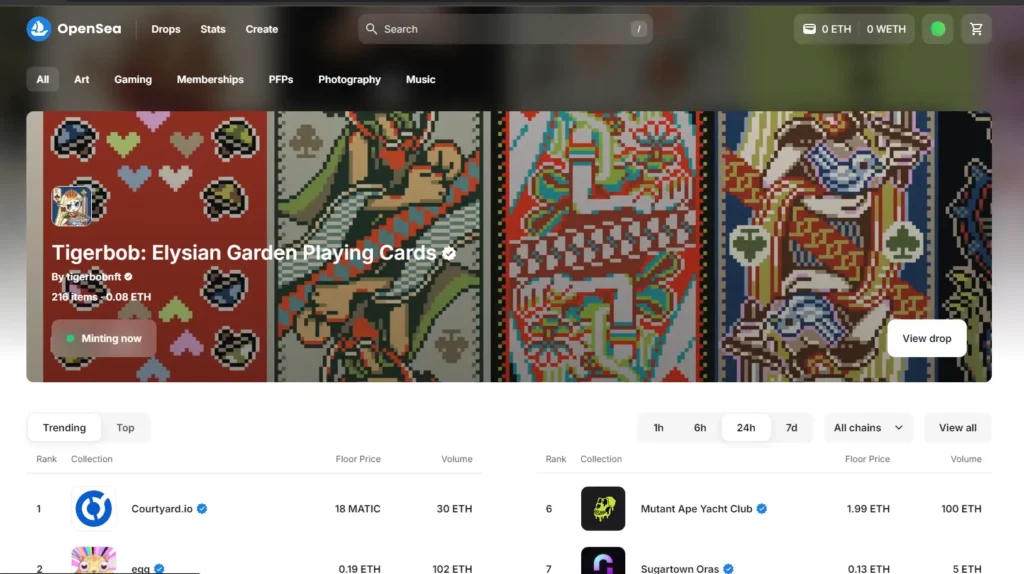
Here, you can buy a variety of digital assets, from domain names to music, trading cards, and even photos. Known for its user-friendliness, OpenSea also charges a 2.5% minimum fee for both primary and secondary transactions.
Rarible
Another trusted platform in the NFT marketplace list is Rarible. Not only is it trusted, but it also brings various features that are not available on other platforms.
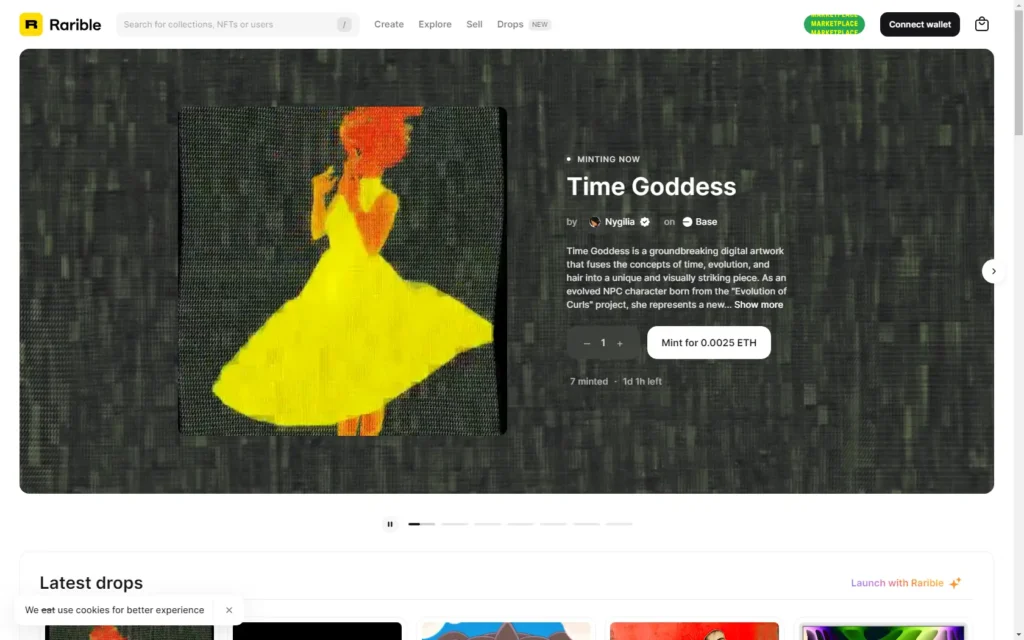
With a small 1% trading fee, Rarible emerged as a go-to platform for crypto rookies. You can explore a wide range of NFTs in art, photography, metaverse, and more.
Rarible boasts the utmost user-friendliness, but it’s advised that you carefully read any instructions to avoid problems while trading.
Solanart
As suggested by its name, Solanart is a website primarily created for the Solana Network. While still a small platform, it’s gaining lots of buzz, beating even some of the bigger competitors.
Nifty Gateway
Another top contender for the best NFT market lineup is the Nifty Gateway platform. This network specializes in Ethereum-based NFTs and offers a mere 2.5% trading fee.
Interestingly, it offers a wide range of payment options, including crypto, Gemini account, debit, and credit card. Because of the wide wallet support, it’s a fan favorite.
Binance NFT Marketplace
Another well-reputed platform in the digital finance space, Binance, has jumped into the NFT wagon. The platform is already integrated with other service providers, enabling the buying and selling of NFTs across various ecosystems.
The exchange and marketplace support various wallets, including Trust Wallet, MathWallet, MetaMask, and Binance Chain Wallet. Additionally, the smart contract impact option is available here.
SuperRare
SuperRare lives up to its name, offering space for crypto-based NFT trading. Despite being small, SuperRare has earned global respect. It accepts wallets, including Formatic, Metamask, and others, charging 3% for every trade and a 15% commission on every first-time sale.
Foundation
Foundation is a sleek, user-friendly platform for buying and selling NFTs. It is specifically designed to trade digital art, including images, videos, and other 3D graphics. With a 5% fee on every transaction, Foundation is among the most costly NFT marketplaces. However, due to its user-friendliness, it still enjoys a global user base.
Mintable
Mintable towers above its peers owing to its fine and unique fee structure. The platform charges a 2.5% fee for regular NFTs, 5% for gasless NFTs, and 10% for printable NFTs.
Async Art
If you are new to cryptocurrency and want to start NFT trading, this platform is the best choice. This platform is exclusively designed for all people. You can represent your NFT work here, and others will buy it. Moreover, it is one of the best NFT markets for beginners.
MakersPlace
MakersPlace is the eBay of NFTs, where you can create and sell assets at any time. This network supports wallets like WalletConnect, Formatic, Portis, and Metamask and offers flexibility for all NFT enthusiasts.
KnownOrigin
The best choice for those who know nothing about NFTs is the KnownOrigin platform. It is available for people who are engaged in learning NFTs. The wallets that it supports include Fortmatic, MetaMask, and Portis.
Magic Eden
Magic Eden shines with a smooth, hassle-free interface. Supporting thousands of daily listings and zero trade fees, it is an attractive option for anyone looking for a top NFT marketplace without breaking the bank.
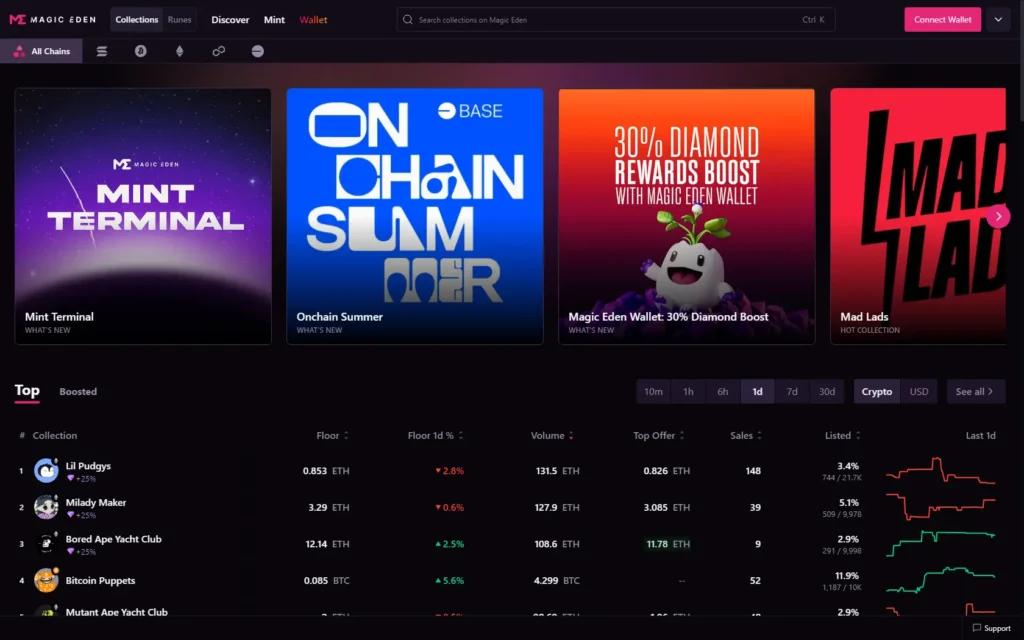
SolSea
SolSea offers a unique twist to the decentralized NFT marketplace space. Its native calendar feature keeps track of all upcoming NFT drops. With a 3% transaction fee, SolSea has a unique offering that makes it a favorite for creators.
GameStop
GameStop’s NFT marketplace uniquely combines blockchain and gaming, making it a perfect home for NFT enthusiasts and gamers. Founded in 2022, GameStop is already thriving and is able to attract Web2 and Web3 users.
Larva Labs
The mastermind behind CryptoPunks, Larva Labs is home to one of the largest NFT collections. Each CryptoPunk has its uniqueness, with traits making them rare and highly valuable. The ownership and history of each Punk are stored on the Ethereum blockchain, making them prized possessions in the NFT world. Larva Labs offers a market for the Punks.
Ethernity Chain
Ethernity Chain has its very own inbuilt NFT marketplace featuring collections themed around Dan Marino, Copa America, and Muhammad Ali. This Chain, which was launched sometime in 2021, has been thriving since its dawn. However, the marketplace charges high fees.
NFTify
NFTify stands out from other marketplaces by providing creators with the option to create their own NFT shops. It offers a user-friendly option to quickly create your own NFT market.
The platform’s transaction charges are 2.5%. The network offers a wide range of payment methods, including fiat.
NBA Top Shot NFT
This is a marketplace for basketball enthusiasts. Here, you explore highlights, video clips, and artwork associated with the beautiful game of basketball. This marketplace is a product of the NBA and hence holds exclusive rights to the videos.
This marketplace is especially good for sports collectors, lovers, and general athletes. The costs associated with this marketplace stand at 5% for every transaction.
Mintbase
With this Ethereum-based platform, creators, collectors, and general users can produce and trade NFTs with utmost ease. Mintbase is especially vital for creators in the music industry, including artists and NFT musicians.
So, what about the fees? Mintbase charges a 2.5% fee on normal sales, 5% on gasless things, and 5% royalties on secondary sales.
The Mark Cuban-supported platform, which aims to challenge OpenSea, is already thriving in the NFT space.
Axie Marketplace
For gamers, Axie marketplace is your deal.
With about 2 million active users, the Axie network was definitely a must-add to our list. On the Axie network marketplace, gamers can trade Pokemon-like in-game characters called Axies.
Axie Infinity marketplace has a very active Discord community. Moreover, it’s among the few platforms that allow NFT buyers to pay with credit cards and PayPal.
Zora NFT
A free platform for anyone to join, Zora is home to a wide range of NFTs based on the Ethereum blockchain network. It supports the auction-style NFT sale system and employs royalties for creators.
The only payment method accepted on Zora NFT marketplace is simply cryptocurrency. You cannot use credit cards or PayPal.
There are no fees associated with transactions on Zora.
Blur NFT
The Blur Marketplace is positioned among the largest NFT marketplaces by volume, especially since 2023. In fact, when writing this report, the Blur marketplace’s all-time trading volumes stood at over $11.2 billion.
At launch, Blur became one of the most disruptive developments in the NFT space, bringing lower royalty fees of 0.5%. However, there are no trading fees on Blur.
Crypto.com NFT marketplace
As an exchange and marketplace, Crypto.com thrives among most of its primary peers. Unlike many other platforms, the Crypto.com marketplace is highly trusted owing to its services as a crypto exchange in the past.
LooksRare NFT
The community-focused NFT platform LooksRare, launched in January 2022, also joins our list of top NFT marketplaces. LooksRare charges 2% of all transactions, and the fees are paid in WETH.
WazirX NFT
A product of another crypto exchange, WazirX NFT thrives in the NFT collecting business. This marketplace, unlike most mentioned above, is primarily built on the Binance Smart Chain and charges a 5% service fee. The platform has been able to capture the attention of many, especially in India, where it is based.
DraftKings Marketplace NFT
DraftKings is a US-based platform allowing its users to bet on sports. After its birth, the platform saw massive success, and it eventually decided to launch an NFT marketplace. On this platform, you can access collectibles from Tony Hawk, Tom Brady, and Wayne Gretzky.
As of 2024, there were only a few hundred non-fungible tokens, but there are plans to expand the selection. You can buy using PayPal, credit card, debit card, bank transfer, or wire transfer.
OKX Marketplace
OKX is among the crypto exchange networks with its own native NFT marketplaces. The OKX marketplace does not support a specific niche of NFTs. In fact, the platform supports different categories, including sports, artworks, utilities, virtual worlds, music, and more. Moreover, the OKX marketplace is available in many blockchains, including Ethereum, BSC, and Solana.
DappRadar NFT
DappRadar is a platform created specifically as a data aggregator for the cryptocurrency realm. However, it also hubs a marketplace where users can see information on their favorite NFTs. However, you can not buy or sell NFTs on this marketplace.
Minxie NFT
Minxie offers a platform for creators to develop a blend of free and paid NFTs. This allows the creators to have a hub where new clients can easily discover them.
Sorare NFT
Another platform, Sorare, offers NFTs associated with an online fantasy football game. Participants in Sorare create new weekly lineups and earn in-game points based on their performance in real matches. At the heart of this platform are NFTs, which give players ownership over the in-game cards. Sorare offers a marketplace where you can trade these cards.
Key Trends Shaping NFT Marketplaces in 2025
As the NFT space grows, game-changing trends have emerged, redefining the operation of these platforms. In recent years, several major developments have taken center stage, likely to redefine the NFT space for months. Here are a few recent trends:
Layer-2 Integration
Yes, Layer 2 solutions have been here for quite some time now. These solutions focus on reducing gas charges and speeding up transactions.
Creators on the Ethereum blockchain, especially, have been wrestling with high gas costs and slow speeds. Yet, L2 solutions process transactions off the main Chain, offering a faster, cheaper, and more efficient route for NFT transactions.
NFTFi (NFT Financialization)
The recent blend of Decentralized Finance (DeFi) and NFT, NFTFi, brought earning opportunities to the NFT realm. In 2025 and beyond, investors expect a bigger expansion of the NFTFi realm. Some financial options include lending, staking, and collateralization, all expected to bloom in the coming months.
Interoperability
As of 2025, there are already dozens of blockchains with support for Non-fungible tokens, each offering its unique twist. Cross-chain NFT marketplaces allow investors to mint, buy, sell, and trade non-fungible tokens on multiple blockchains. In some cases, like in Cosmos, it is possible to bridge assets between two chains.
Fractionalized NFTs
Fractional NFTs have been gaining massive attention in the past months as they offer lower barriers of entry for collectors. The chance to own only a fraction of an NFT means the need for even less investment and risk.
NFT marketplaces offering the option to own a fraction of the NFT provide a platform where collectors can increase liquidity.
Conclusion – NFT Buying and Selling Marketplaces
In the digital age, securing your NFTs is a key to long-term success in the industry. Each top NFT marketplace mentioned above provides a secure platform to invest in digital assets. Go to these platforms, create your account, and start your NFT-trading journey.
With NFT trading strategies becoming important in this era, it’s time to explore, research, and invest in the NFT pool.
FAQ – Frequently Asked Questions
NFT marketplaces have a wide range of assets, including digital art, collectibles, music, virtual real estate, and more. The variety of assets available depends on the specific marketplace.
While the primary focus is on digital assets, some platforms may support the concept of phygital or hybrid NFTs, where a physical item is linked to a corresponding digital token. Check the specific platform’s guidelines for details.
While blockchain provides authenticity, it’s essential to understand the marketplace’s terms regarding intellectual property. Some platforms offer customizable licenses, allowing creators to specify usage rights and protections.
